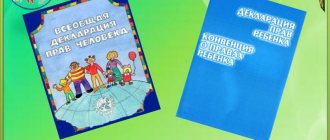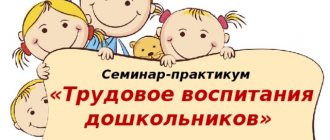Have you ever thought about what society should give to a child? Let us give examples of the guarantees that any preschooler attending kindergarten has. From birth to adulthood, children have their own individual “privileges.” All the rights of a child (any father or mother should know them briefly) are set out in the UN Convention.
Parents' responsibilities include strict monitoring to ensure that no one disturbs them while visiting kindergarten. If we analyze reality, then in practice the rights of the child in kindergarten are violated, but none of the violators receive the deserved punishment, because children do not always complain to their parents about their teachers.
What is the Convention?
This document was adopted by the UN, and it is far from the only normative act that touches on the topic of “Children’s Rights”. European countries pay significant attention to the problem of protecting preschool children, realizing that at this age they are unable to stand up for themselves on their own. Any civilized state has its own regulatory documents that list the rights of the child (in kindergarten, in particular).
Medical support
As for health protection, the rights of the child in the Constitution of the Russian Federation also contain clauses regarding health protection. They state that every minor has all rights and freedoms in the field of medical care. He can:
- Get treatment and observation at a dispensary.
- Take advantage of preferential conditions for food and medical care.
- Receive information about his/her health status in a form that, according to the protection of children's rights, is accessible to his/her age.
- Study and work in conditions that exclude the adverse effects of various factors on his health.
What is very important, the protection of children’s rights in the Russian Federation allows minors who have reached the age of 15 to voluntarily agree or refuse medical intervention in writing.
Healthcare costs in the Russian Federation.
What documents regulate guarantees in the Russian Federation?
In our country there is a Family Code, in addition, there is a Law “On Basic Guarantees of the Rights of the Child in the Russian Federation”. These documents are fundamental for social workers who monitor the well-being of families. The rights of a child in a preschool educational institution are protected by the Law “On Education”. There are also administrative documents and instructions in which they are also spelled out. Such regulations stipulate all the rights of a child in a preschool educational institution; parents should carefully read them and, if necessary, protect their children based on these laws.
Education
Education is the most important condition on which not only the career, but also the well-being of every citizen depends. Therefore, the Civil Code of the Russian Federation states that every child can study at school for free. Moreover, the state legislatively regulates the education system so that it helps every student:
- develop culturally;
- develop personal judgment;
- foster moral responsibility.
All this will help everyone, over time, benefit the society that gave him all these opportunities.
Responsibility for the quality of education lies not only with educational institutions, but also with parents: the child must be provided with all the conditions for learning, as well as games, the purpose of which is to improve education.
Realization of the child's right to education.
The state also defends the right of people with disabilities to education: for this purpose, various educational institutions of various types have been opened.
Child's rights to education
The types of rights associated with education are as follows. The child can:
- Take an accelerated course.
- Use information and library resources.
- Get additional education.
- Study in your native language or choose any other language of instruction provided by the educational system.
- Move to another educational institution if the educational institution ceases its activities. But at the same time, according to the rights of the child in the Russian Federation, he must agree on his decision with his parents.
- Defend and defend your decision to change professional training. If he does not like his future profession, it is unacceptable to violate the child’s personal rights in this matter.
- Realize your desire to obtain higher education.
Expenses on education in the Russian Federation.
Getting ready for kindergarten
Russian reality is such that enrollment in a kindergarten often begins immediately after the baby is born, but a child can only enter the institution after reaching the age of three. The reason was the increase in the birth rate, as well as the closure of many preschool educational institutions during the destruction of the USSR. To solve the problem associated with the lack of space, new gardens are being built these days, but it is not yet expected to be completely eliminated.
To protect the fundamental right of a child in kindergarten, namely the child’s ability to attend this institution, the law established the obligation of authorities to provide children with a vacant place to receive preschool education. As soon as it’s your baby’s turn to decide on a deployment, various problems arise in the family. First of all, this is due to the fact that the child is waiting for a new stage in his life, he has anxious feelings, because it is not clear what exactly will happen in a new place, where there will be no father or mother next to him. The feelings of parents who expect their child to enter a preschool institution are much brighter. They feel concern, sadness, some fear, and excitement for their future “student.”
One of the serious issues that should not fall out of the sight of parents is the rights of the child in kindergarten. Not all modern mothers and fathers have a complete understanding of them. Although ignorance sometimes gives rise to very serious mental problems, which are very difficult to correct even after a few years. The content of the child’s rights is a problem that not every father or mother thinks about, while educators can take full advantage of it.
Until what age is a child considered such?
A child is considered a person who has not reached the age of majority (eighteen years of age). But there are also exceptions. The first case is if a 16-year-old teenager, with the consent of his parents (guardian, adoptive parent), gets a job, signs a contract or employment agreement, and engages in volunteering.
As an option, a 16-year-old teenager begins to engage in entrepreneurial activity, then he can already be declared legally competent. Another case is marriage before adulthood. In this case, the teenager is considered legally competent from the day the marriage was concluded.
For information about what emancipation of minors is, see the following video.
Minors and minors
By law, children were divided into two categories - minors and minors. Depending on the category of children in the Russian Federation, whether they are minors or minors, children and their parents are provided for by law with various rights and freedoms. A child is considered a minor from birth to the age of fourteen.
At the age of 14, a teenager becomes a minor. The rights and freedoms of each child depend on which category he belongs to. So, until he turns 14 years old, all issues are resolved by his parents (guardians, adoptive parents).
At the age of 14, a person already has the right to independently make decisions about small transactions, and upon reaching adulthood, he acquires the rights of an adult, becomes fully capable and has all the civil rights and responsibilities of other citizens of the state.
According to the law of the Russian Federation, 14 years is the period for obtaining a passport.
What is guaranteed for preschoolers?
We list the basic rights of a child in kindergarten for parents so that they can protect their children (if necessary). So, this is the right of the child:
- To obtain an education, as well as to form and develop creative and physical abilities. Any preschool institution is obliged to provide additional educational activities for children. In addition to walks in the fresh air, games, the baby should be promoted in the direction of mental development. To achieve the goal, teachers working in kindergartens help children improve, gradually complicating the tasks they solve (even if at first glance they seem quite simple for adults). In the absence of developmental activities, there is reason to claim that the guarantee is violated. In our country there is a large-scale network of preschool educational institutions operating around the clock or during the daytime. Educational programs for preschoolers are being updated, and special Federal State Standards have been introduced to regulate the development of children in kindergartens.
- To the game. Based on the development of the baby’s intellectual and creative abilities, one must also remember that play is important for a child. It is here that he acquires communication skills, so educators should pay special attention to variety, which children will not get bored with.
- For health and life. Perhaps these are the basic rights of a child in kindergarten (for parents, these rights are the most important), because if they are not respected, the child’s life may be in serious danger. The Law “On Education” states that a preschool educational institution is obliged to guarantee the life and health of its students. If necessary, the baby must be provided with medical care, therefore, those child care institutions that do not have a medical office violate the guarantee of medical care, and therefore must be closed.
- For protection from abuse. Teachers can often shout at, or even worse, hit children. This is completely unacceptable and must be stopped by both parents and the kindergarten administration.
- To protect the needs and interests of the child. Children must be given due attention; toys and basic hygiene products must comply with all standards.
- For quality food. The baby's body needs a sufficient, high-quality, complete flow of food throughout the day. If children are given products that have expired, the child's rights are violated, and parents can file a complaint with the prosecutor's office.
The child’s right to creative development
According to the Russian Law “On Education”, any child can apply for an individual approach in kindergarten, as well as the identification of his talents and their development. To do this, educators are required to carry out creative activities (drawing, modeling), which cannot be monotonous, and there must also be no discrimination based on the level of ability on the part of the teacher.
Important! The lack of developmental creative activities is a direct violation of the rights of a preschool child.
What is child abuse?
The definition of “abuse” includes beatings, sexual, emotional or physical violence (for example, yelling, insults, humiliation). In kindergartens, violations of this kind occur quite often, and teachers consider it normal to shout at children, call them ugly names, and slap them in the face. If you find out that a child’s rights are being violated (examples of such situations are common), that is, some kind of violence was used against the child, transfer him to another preschool institution.
Can parents protect children in preschool institutions?
It is parents who can and must ensure that the rights of their children in preschool educational institutions are not violated. When choosing a kindergarten, mothers and fathers are obliged to check the level of qualifications of the teachers to whom they will take their children. If, after the first visit to kindergarten, the baby is capricious at home, refuses to sleep, or cries for no reason, then a feeling of discomfort is obvious. Parents should closely monitor the baby; if after 3-4 days his behavior does not change, nervousness increases, talk to the teachers. If after the conversation nothing changes and the child refuses to go to kindergarten, look for another preschool institution for him.
How should parents behave if violations are detected?
First, you need to contact the head of the kindergarten in writing and ask him to stop unlawful actions on the part of the employees. If there are no positive results, file a complaint with the prosecutor's office. An internal investigation will be conducted in this institution, and parents who believe that the rights of their child were violated by employees of the preschool institution will be informed of its results.
The main task is to remember that a child of 2-3 years of age will not be able to stand up for himself. Of course, today many children at this age already know how to turn on the TV to watch cartoons or “rummage” through their father’s mobile phone. However, this does not mean that they will be able to repel an impolite teacher who tries to shout or hit. Try to ask your child more often about events in the garden. Very often he remembers the most vivid pleasant and unpleasant moments, so he can somehow tell you about them. After this, do not postpone active actions until later, so that the child does not receive mental trauma.
What rights does current legislation guarantee for a child?
The Universal Declaration of Human Rights issued by the UN regarding the rights of the child contained the following declaration: due to the fact that children are still physically and mentally immature, they must be guaranteed legal protection.
This will help ensure protection and care from the moment of conception until the age of 18. To ensure that children can live a happy life, several important principles have been established to ensure a happy childhood.
Principles of the Declaration
The most important of them states that every child has all fundamental rights that should be recognized by both other children and adults. Discrimination on grounds such as religion, language, gender, skin color, race, political or other opinions, national or social origin, property status or any other circumstances that affect both children and members of their family is prohibited.
Principles of the Declaration of the Rights of the Child.
Every citizen of the Russian Federation from birth has the right to receive a last name, first name and patronymic. They can be given by both parents and adoptive parents. If a father and mother have different surnames, which one their son or daughter will bear is decided by mutual agreement. If the parents could not agree, the child’s first and last name is given by the guardianship and trusteeship authority.
If parents do not like the name chosen by themselves or a government organization, they have the right to change the surname or first name, but until their child turns 10 years old. If the daughter or son is over 10 years of age, then, according to legal protection, it is possible to change the child’s last name or first name only if he agrees with this decision.
Social protection
Under the current law, a minor citizen is provided with social protection. He is also provided with favorable conditions so that he has the opportunity to develop spiritually, morally, mentally and physically, his freedom, dignity, social rights and interests are not oppressed by other people: the main goal of all legislative acts of the Russian Federation regarding children is to best ensure the interests of each child until 18 years.
Expenditures on the social sphere of the Russian Federation.
Family law
Family law says: in order for a child to develop fully and harmoniously, he needs love and understanding, which only a family can give - natural or adoptive parents, guardians.
Material and moral security, an atmosphere of love in the family circle, parental responsibility - all this ensures a happy childhood for every child. The most important right of minor children is to always remain with their mother and only in exceptional cases is separation from her allowed. Society and public authorities are obliged to take care of the rights of orphans who have no family and no means of subsistence.
If a child lives in a large family, the ombudsman for children’s rights in the constituent entities of the Russian Federation must ensure that this family is provided with benefits from the state so that they can support the children.
Just about the main thing. Family law in the Russian Federation. We recommend watching it.






